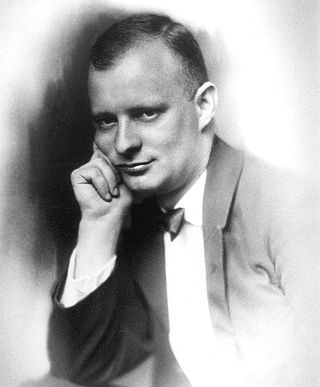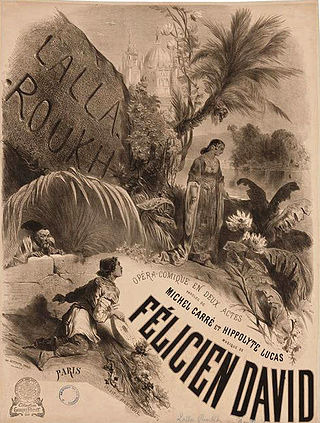
Feramors is an opera in three (first version) or two (second version) acts by Anton Rubinstein to a libretto by Julius Rodenberg. The story is based on Lalla Rookh by the Irish poet Thomas Moore. The opera was composed in 1862.

Feramors is an opera in three (first version) or two (second version) acts by Anton Rubinstein to a libretto by Julius Rodenberg. The story is based on Lalla Rookh by the Irish poet Thomas Moore. The opera was composed in 1862.
The opera was premiered at the Semperoper in Dresden on 24 February 1863, [1] and had subsequent stagings in Vienna (1872), Milan (1874), Berlin (1879), and Danzig (1880). Its first production in Russia was an amateur performance in Saint Petersburg in 1884. The first professional production there was on 18 August 1898 at the Mariinsky Theatre, conducted by Felix Blumenfeld. [2] The reason for its late appearance on the Russian stage was competition from an opéra-comique on the same subject by Félicien David. Peter Tchaikovsky, who heard the opera at the Berlin 1879 staging, liked the opera and wrote to Nadezhda von Meck that "it comes from the period in which Rubinstein did all his best work, that is 20 years ago". [3]
Perhaps the same Berlin production of 4 March 1879 produced an interesting report in the Musical Times ; "Rubinstein's opera ... was successfully produced on the 4th ult. at the Royal Opera house at Berlin, the principal rôles being taken by Herr Niemann and Madame Mallinger; in consequence, however, of the latter having refused to sing certain portions of her part, the composer abstained from personally conducting his work." [4]
| Role | Voice type |
|---|---|
| Lalla Roukh, princess of Hindustan | soprano |
| Hafisa, her friend | contralto |
| Feramors, a minstrel | tenor |
| Fadladin, ruler (Grossvezier) of Hindustan | bass |
| Chosru, ambassador of the king of Bokhara | baritone |
| A muezzin | tenor |
| A messenger | tenor |
Lalla, the princess of Hindustan, is engaged to marry the King of Bokhara, but falls in love with the minstrel Feramors, who turns out to be the King in disguise.
There are a number of recordings of the ballet music from the opera, which includes a 'Torch Dance' and a 'Dance of Bayaderes', both written in the composer's style of exotic orientalism. [5]

Ariadne auf Naxos, Op. 60, is a 1912 opera by Richard Strauss with a German libretto by Hugo von Hofmannsthal. The opera's unusual combination of elements of low commedia dell'arte with those of high opera seria points up one of the work's principal themes: the competition between high and low art for the public's attention.

Sadko is an 1898 opera in seven scenes by Nikolai Rimsky-Korsakov. The libretto was written by the composer, with assistance from Vladimir Belsky, Vladimir Stasov, and others. Rimsky-Korsakov was first inspired by the bylina of Sadko in 1867, when he completed a tone poem on the subject, his Op. 5. After finishing his second revision of this work in 1891, he decided to turn it into a dramatic work.
Where the Wild Things Are, Op. 20, is a fantasy opera in one act, nine scenes, by Oliver Knussen to a libretto by Maurice Sendak, based on Sendak's own 1963 children's book of the same title. Knussen composed the music from 1979 to 1983, on commission from the Opèra National, Brussels.

Der Zwerg, Op. 17, is an opera in one act by Austrian composer Alexander von Zemlinsky to a libretto by Georg C. Klaren, freely adapted from the short story "The Birthday of the Infanta" by Oscar Wilde.

We Come to the River – Wir erreichen den Fluss is an opera by Hans Werner Henze to an English-language libretto by Edward Bond. Henze and Bond described this work as "Actions for music", rather than an opera. It was Henze's 7th opera, originally written for The Royal Opera in London, and takes as its focus the horrors of war. The opera was first performed at the Royal Opera House, Covent Garden, London on 12 July 1976, with the composer as producer, Jürgen Henze as director, and David Atherton conducting. It was subsequently staged at the Deutsche Oper Berlin, and received its first American performance at Santa Fe Opera in 1984, conducted by Dennis Russell Davies.

Guntram is an opera in three acts by Richard Strauss with a German libretto written by the composer. The second act of the opera was composed in Ramacca, Sicily.

König Hirsch is an opera in three acts by Hans Werner Henze to a German libretto by Heinz von Cramer after Il re cervo, a theatrical fable (1762) by Carlo Gozzi. He revised it as Il re cervo, premiered in 1963 at the Staatstheater Kassel.

The Nightingale is a short opera in three acts by Igor Stravinsky to a Russian-language libretto by him and Stepan Mitusov, based on a tale by Hans Christian Andersen: a nasty Chinese Emperor is reduced to tears and made kind by a small grey bird. It was completed on 28 March 1914 and premiered a few weeks later, on 26 May, by the Ballets Russes conducted by Pierre Monteux at the Palais Garnier in Paris. Publication, by the then Paris-based Éditions Russes de Musique, followed only in 1923 and caused the opera to become known by its French title of Le Rossignol and French descriptor of conte lyrique, or lyric tale, despite its being wholly Russian.

A Village Romeo and Juliet is an opera by Frederick Delius, the fourth of his six operas. The composer himself, with his wife Jelka, wrote the English-language libretto based on the short story "Romeo und Julia auf dem Dorfe" by the Swiss author Gottfried Keller. The first performance was at the Komische Oper Berlin on 21 February 1907, as Romeo und Julia auf dem Dorfe. Thomas Beecham conducted the British premiere at the Royal Opera House, Covent Garden in London on 22 February 1910. The US premiere was on 26 April 1972 in Washington, D.C.

Cardillac, Op. 39, is an opera by Paul Hindemith in three acts and four scenes. Ferdinand Lion wrote the libretto based on characters from the short story Das Fräulein von Scuderi by E. T. A. Hoffmann.

Der Zarewitsch is an operetta in three acts by Franz Lehár. The German libretto by Heinz Reichert and Bela Jenbach is based on the play of the same name by Polish author Gabriela Zapolska. Lehár composed the work, one of his later operettas, as a vehicle for Richard Tauber, the acclaimed Austrian tenor. The work received its first performance at the Deutsches Künstlertheater in Berlin on 16 February 1927, with Tauber and Rita Georg in the leading roles.

Olimpie is an opera in three acts by Gaspare Spontini. The French libretto, by Armand-Michel Dieulafoy and Charles Brifaut, is based on the play of the same name by Voltaire (1761). Olimpie was first performed on 22 December 1819 by the Paris Opéra at the Salle Montansier. When sung in Italian or German, it is usually given the title Olimpia.

Christophe Colomb is an opera in two parts by the French composer Darius Milhaud. The poet Paul Claudel wrote the libretto based on his own play about the life of Christopher Columbus, Le Livre de Christophe Colomb. The opera was first performed at the Staatsoper, Berlin, on 5 May 1930 in a German translation by Rudolph Stephan Hoffmann. Milhaud thoroughly revised the work and produced a second version around 1955. The opera is on a large scale and requires many resources for its staging. As in many of his other works, Milhaud employs polytonality in parts of the score.

Perséphone (Persephone) is a musical work (mélodrame) for speaker, solo singers, chorus, dancers and orchestra with music by Igor Stravinsky and a libretto by André Gide.

Faust is an opera by the German composer Louis Spohr. The libretto, by Joseph Karl Bernard, is based on the legend of Faust; it is not influenced by Goethe's Faust, though Faust, Part One had been published in 1808. Instead, Bernard's libretto draws mainly on Faust plays and poems by Friedrich Maximilian Klinger and Heinrich von Kleist. Spohr's Faust is an important work in the history of German Romantic opera.

Neues vom Tage is a comic opera in three parts by Paul Hindemith, with a German libretto by Marcellus Schiffer.

Medea is an opera in three acts composed by Giovanni Pacini to a libretto by Benedetto Castiglia. It premiered on 28 November 1843 at the Teatro Carolino in Palermo, conducted by the composer with Geltrude Bortolotti in the title role. The libretto is based on the plays Medea by Euripides and Médée by Pierre Corneille.

Issé is an operatic pastorale héroïque by the French composer André Cardinal Destouches. Initially it was in three acts. The definitive revised version consists of a prologue and five acts. The libretto was by Antoine Houdar de la Motte. Although Destouches was only 25 at the time of its premiere, it is considered his best score.

Lalla-Roukh is an opéra comique in two acts composed by Félicien David. The libretto by Michel Carré and Hippolyte Lucas was based on Thomas Moore's 1817 narrative poem Lalla Rookh. It was first performed on 12 May 1862 by the Opéra-Comique at the Salle Favart in Paris. Set in Kashmir and Samarkand, the opera recounts the love story between Nourreddin, the King of Samarkand, and the Mughal princess Lalla-Roukh. Her name means "Tulip-cheeked", a frequent term of endearment in Persian poetry.